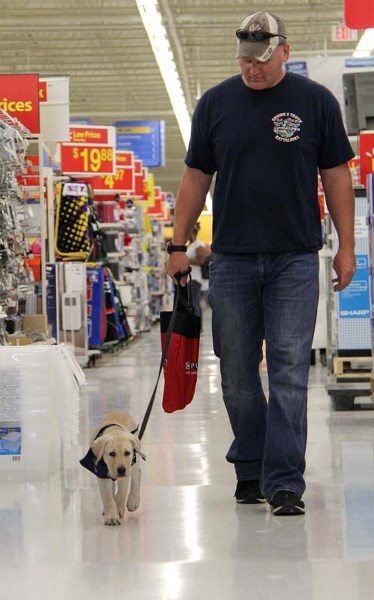Every night before bed, Max, a nearly two-year-old yellow Labrador retriever, puts his paws half way up the ladder on his best friend's bed. He waits longingly until six-year-old Dominic gives him a good night hug and kiss.
Dominic was diagnosed with autism when he was two-and-a-half years old. He is non-verbal and therefore classified as low functioning, explained his grandmother Hali Fitzpatrick. The boy is different when Max is around.
"(Max) seems to sense when Dominic's anxiety is rising and he'll go and sit right beside him. If Dominic seems down, Max will go and lay with him and try and tickle him with his nose," she said.
Dominic and Max's lifelong match began in April through Dogs with Wings Assistance Dog Society, an organization that provides service dogs for people with disabilities such as visual impairment, autism, Down syndrome, global developmental delay, cerebral palsy and multiple sclerosis.
In order to train assistance dogs, the foundation is in need of volunteer foster homes for up to two years of each dog's life. Families in St. Albert are currently raising seven dogs.
"Our long term strategic plan calls for upwards of 25 dogs per year and we just added a second trainer specifically for our autism service dog program," said John Wheelwright, executive director of Dogs with Wings in Edmonton.
The organization needs more puppy parents so it can increase the number of dogs it can match to disabled clients.
Active lifestyle
After the puppies are taken from their mother at eight to nine weeks of age, they are placed in volunteer homes where they are house broken and socialized. Raisers are encouraged to do as much as they can with the pups, from taking them to the dentist or to the movie theatre, Wheelwright said.
"A client is going to need a dog that understands what it's like to ride on a bus, an LRT, a taxi, or a trip to the grocery store," he said. "We don't want anything to phase them once they graduate."
Starting around 11 weeks of age, foster parents are required to take the dogs to obedience classes once or twice a week. The classes teach the young pups to focus on the handler and walk next to them in a controlled manner, as well as to respond to verbal cues and hand signals.
Dogs with Wings pays for dog supplies such as food and veterinarian bills, while volunteers are required to provide a safe and stable home. Wheelwright said the best dog handlers are calm and consistent when working with the dogs. They are willing to follow training techniques and provide feedback.
Similar to the process of matching a dog with a client, the process to become a foster parent requires a home visit, and above all, time and patience.
"It's not the easiest thing in the world, but for a family that's looking to teach their children about the notion of volunteerism and paying it forward, it's a wonderful learning opportunity," said Wheelwright.
After 12 to 14 months in volunteer homes, the dogs graduate to a more formalized training program.
For Fitzpatrick's family the entire process took about two years, but was well worth the wait, she said.
The addition of Max to the family has not only brought an extra set of hands – or paws – but also, hope.
"I'm a lot more relaxed because he gives Dominic so much more independence," Fitzpatrick said. "With him having bolted on me before, I was always nervous in public, now I'm not."
"(By) taking in these puppies you're improving someone's quality of life in ways that I don't think most people can comprehend," she added.
"To say I'm grateful is just not enough. (His puppy raisers) changed our lives."
For more information about Dogs With Wings, visit www.dogswithwings.ca or phone 780-944-8011.




